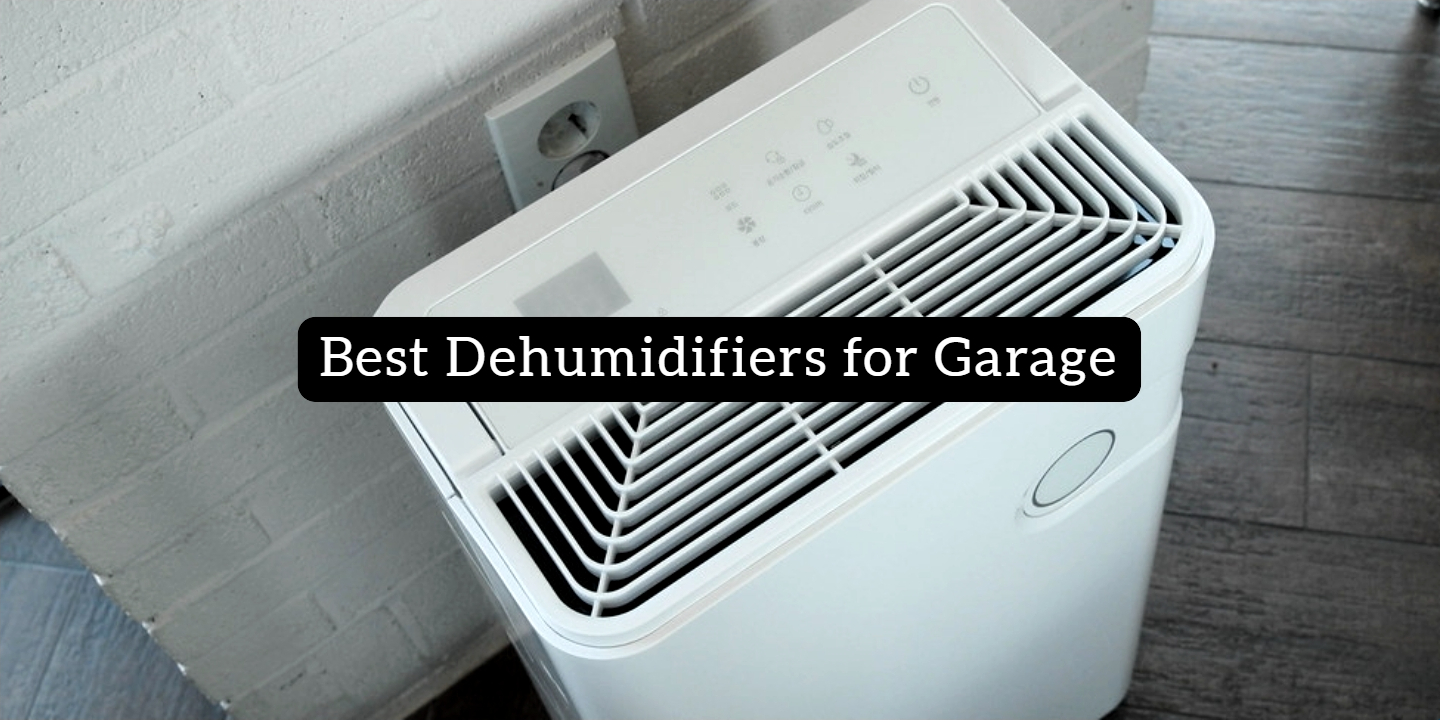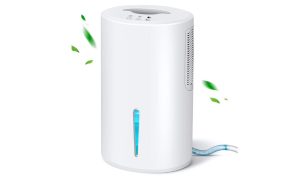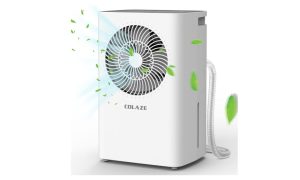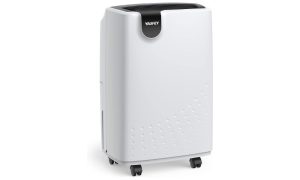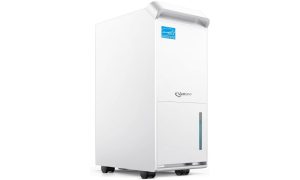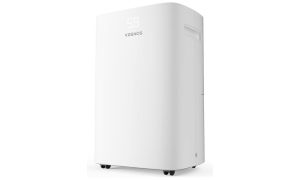Tired of damp tools and the constant battle against mold? Well, you’re in for a treat!
We’ve rounded up the best dehumidifiers for garage you could try. If the moisture level in your garage is too high, these will be your best weapons against dampness.
Whether you have a single-car garage or a sprawling workshop, there’s a mode for you. We’ll cover all the aspects like capacity, coverage area, and water tank size to help you decide. Let’s get started!
Gocheer Dehumidifier
Tight on budget but need to tame the humidity monster in your garage? This is one of the less pricey models you could find. It’s a gem for those who need to address occasional dampness or prevent minor moisture problems. It can cover up to 480 square feet, so it will work for single-car garages petty well.
Pros:
- Low-cost: One of the cheapest models on the market.
- Tank size: The 0.53-gallon tank holds more water than you might expect for a budget model.
- Warranty: Backed by a 15-month warranty, offering some security.
Cons:
- Performance: Dehumidifies a measly 2 pints per day, making it unsuitable for large spaces or serious moisture issues.
- Tank Size: The small tank requires regular emptying, which can be inconvenient.
- Noise: Some users report noise levels being higher than desired.
Think Twice:
- Those with serious moisture problems: With a dehumidification rate of only 2 pints per day, this won’t tackle major dampness or large spaces.
- Those seeking quiet operation: Some users find the Gocheer to be noisier than other models.
- People who want continuous operation: The water tank fills up quickly, requiring frequent emptying.
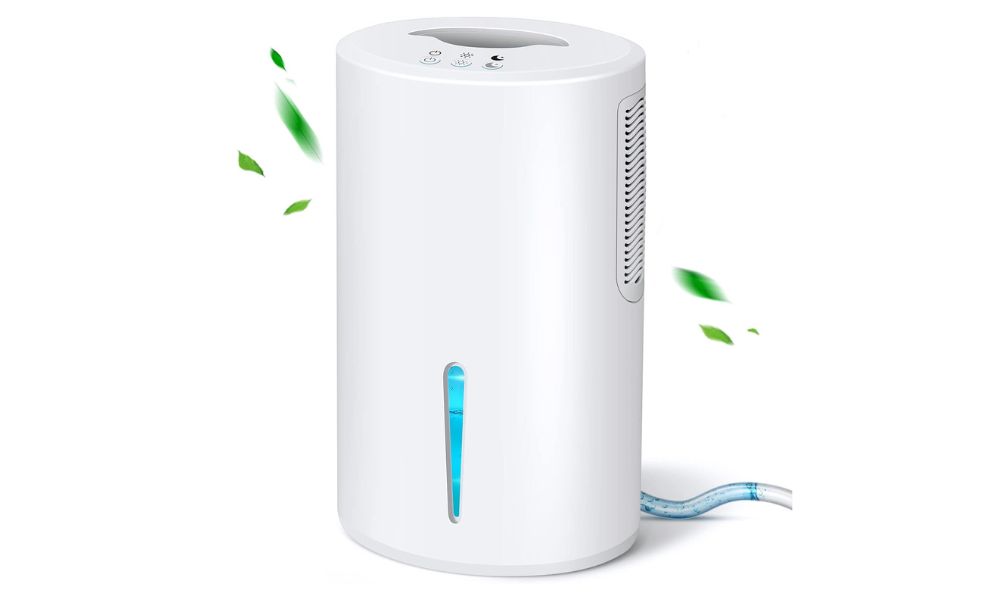
You may also like: 7 Best Garage Exhaust Fans
COLAZE Dehumidifier
This model strikes a mix between aesthetics and function. The 25-pint dehumidification rate tackles moderate moisture issues effectively. And with its 2,000 sq ft coverage area, it will work for most typical garages.
Pros:
- Stylish: A breath of fresh air compared to traditional ones.
- Performance: Handles moderate moisture issues effectively for garages up to 2,000 sq ft.
- Competitive price: Offers good value for the function and format combination.
- Warranty: The 2-year warranty provides security.
Cons:
- Water tank: The 0.66-gallon tank is significantly smaller than competitors, and needs regular emptying.
- Noise: Some find the noise level noticeable, especially in quiet environments.
- Not for extreme moisture: Won’t be enough for areas with severe dampness problems.
Think Twice:
- Those with seriously damp garages: While decent, the 25-pint capacity might not be enough for extreme moisture problems.
- People who dislike frequent emptying: The tiny 0.66-gallon tank needs regular emptying, which can be inconvenient.
- Noise-sensitive individuals: Some users report the noise level being noticeable, especially in quieter settings.
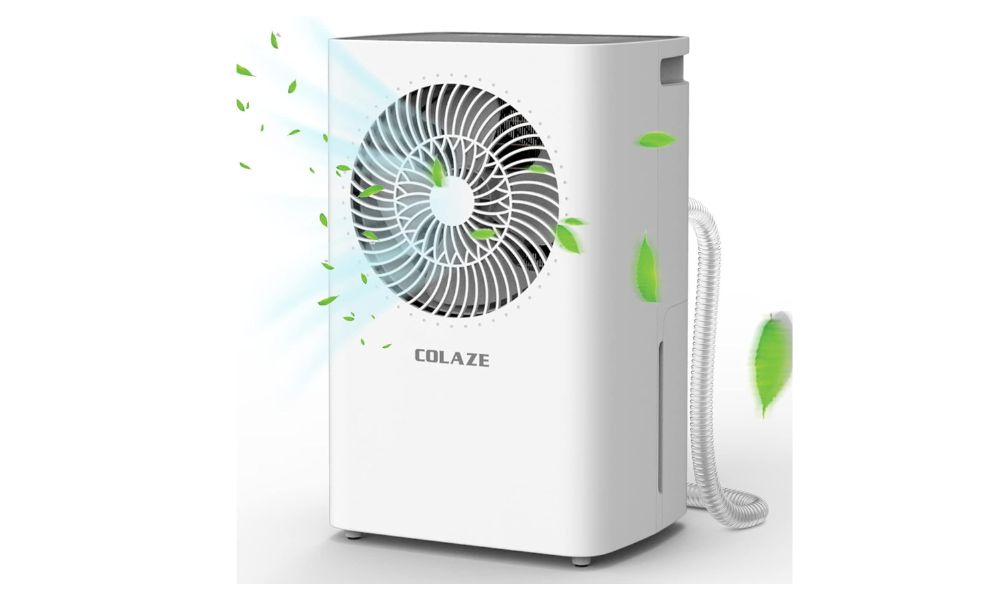
Yaufey Home Dehumidifier
Here’s a model that will be ideal for compact garages or tight nooks where larger models won’t fit. Its 32-pint capacity tackles moderate moisture issues effectively in spaces up to 1,750 sq ft. Lightweight and compact, it’s easy to move around as needed. Plus, the 1-year warranty gives some extra assurance.
Pros:
- Compact size: Fits perfectly in smaller garages or tight spaces.
- Dehumidification: Handles moderate moisture effectively for its size.
- Solid build quality: Well-made with a decent warranty for added assurance.
- Portable: Light and easy to move around.
Cons:
- Tiny water tank: Needs regular emptying, which can be inconvenient.
- Noise: Noise level might be noticeable for some users.
- Not for extreme moisture: Might not be powerful enough for garages with severe dampness problems.
Think Twice:
- Those with major moisture problems: The capacity won’t work for garages with severe dampness.
- People who dislike frequent emptying: The tiny 0.48-gallon water tank requires frequent emptying, especially in humid environments.
- Noise-sensitive individuals: Some users report the noise level being noticeable, especially in quiet settings.
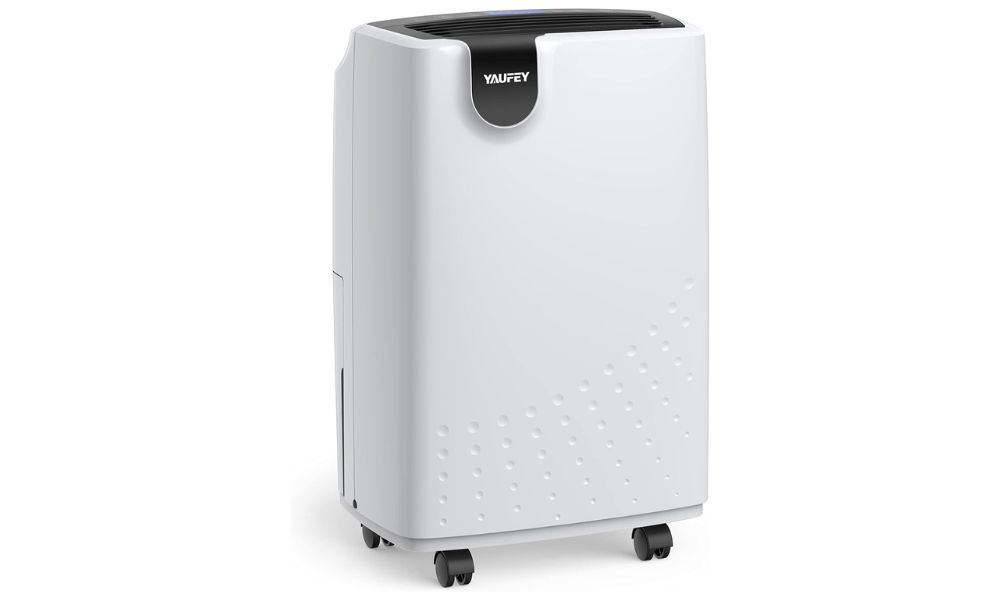
Check also: 7 Best Diesel Garage Heaters
Kesnos Dehumidifier With Drain Hose
If you have a large space plagued by persistent moisture, this one is a solid contender. An auto-drain option with a hose eliminates manual emptying, ideal for hands-off moisture control. Plus, there’s auto humidity sensing and a 24-hour timer.
- Powerful: Effectively tackles large-scale moisture problems.
- Auto-drain: Continuous operation eliminates manual emptying (with hose setup).
- Smart: Controls and auto-humidity sensing for effortless operation.
- Safe: Auto shut-off and restart make it super handy.
- Portable: Castor wheels and handles facilitate easy movement.
Cons:
- Small water tank: Requires frequent emptying, especially with continuous use.
- Price: Might be more expensive than some competitors with similar features.
- Noise: Some users report noticeable noise levels.
Think Twice:
- Small space dwellers: While powerful, it might be overkill for smaller garages or rooms. Consider a smaller, more energy-efficient model if space is tight.
- Those who value large tanks: The 0.66-gallon water tank needs periodic emptying, especially in humid environments or with continuous use.
- Budget-conscious buyers: It’s not the cheapest.
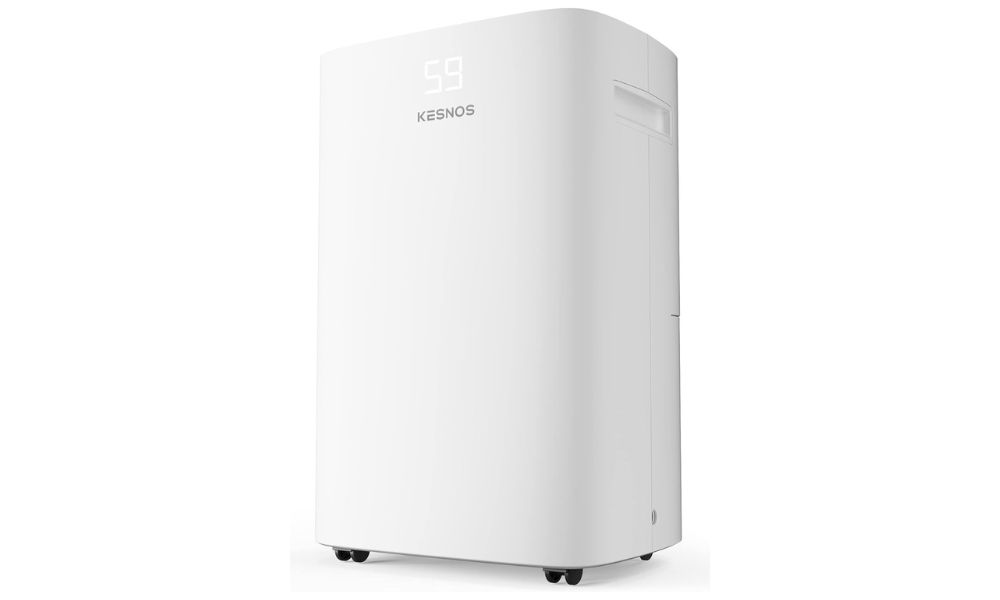
Vellgoo Energy Star Dehumidifier
This model packs a punch for large spaces battling serious moisture issues. It tackles serious moisture issues effectively, stopping mold and mildew growth. Energy Star label guarantees efficient operation, saving you money on energy bills in the long run. Also, a timer and customizable humidity control offer flexibility and ease of use.
Pros:
- Powerful: Effectively tackles serious moisture issues in large spaces.
- Energy Star: Saves money on energy bills, reducing long-term costs.
- Features: Timer and adjustable humidity management for effortless operation.
- Quiet: Whisper-quiet, ensuring undisturbed comfort.
- Warranty: Gives you confidence in the product.
Cons:
- Price: It’s more expensive than some competitors.
- Not for small spaces: It isn’t the most efficient for limited areas.
- Manual emptying required: A tank might need frequent emptying depending on usage.
Think Twice:
- Small space dwellers: This powerhouse might be overkill for smaller areas, potentially leading to over-dehumidification and energy waste.
- Those needing continuous operation: The 1.4-gallon water tank needs routine emptying, especially in humid environments or with continuous use.
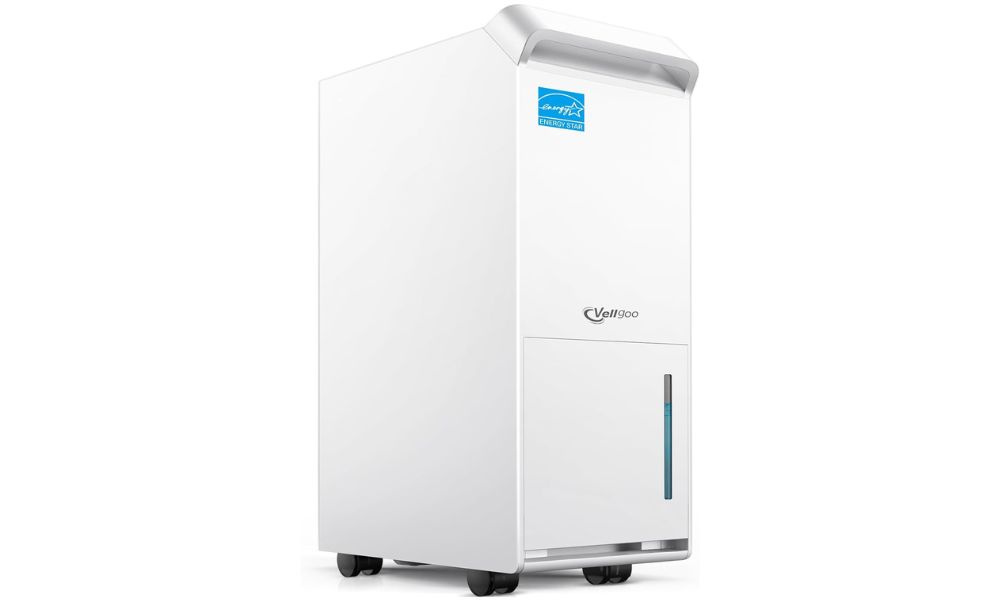
Have a look at: How To Ventilate A Garage With No Windows
Vremi Dehumidifier
Seeking a reliable model with long-lasting performance? This one might catch your eye. With a 22-pint capacity and 1,500 sq ft coverage, it efficiently tackles moderate moisture issues. The 0.8-gallon water tank is larger than expected for its size, reducing the need for frequent emptying.
Pros:
- Reliable: The 3-year warranty gives peace of mind for extended ownership.
- Quiet: Won’t disrupt your peace, ideal for living spaces or areas where noise is a concern.
- Water tank size: The 0.8-gallon tank requires less frequent emptying compared to some competitors.
- Effective: Handles moderate humidity issues effectively in spaces up to 1,500 sq ft.
Cons:
- Limited power: Might not be strong enough for heavy-duty moisture control.
- Energy: Energy consumption might be higher than competitors with similar capacity.
- Coverage: Not ideal for garages significantly larger than 1,500 sq ft.
Think Twice:
- Serious moisture warriors: This one is not powerful enough for garages with severe dampness or large-scale moisture problems.
- Energy cost watchers: Consider energy consumption compared to competitors, as lower dehumidification might not always translate to the most efficient performance.
- Large space dwellers: For garages exceeding 1,500 sq ft, a more powerful dehumidifier with wider coverage would be more suitable.
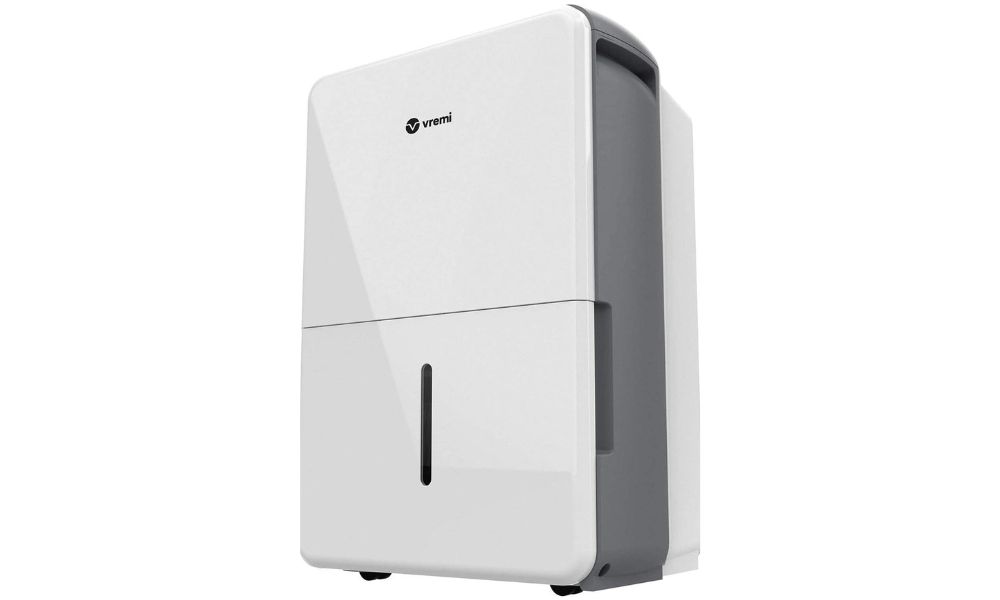
You may also check: 7 Best Garage Thermometers
hOmeLabs Energy Star Dehumidifier
This one is a true powerhouse for battling extreme moisture in large spaces. The auto-drain hose option allows for continuous operation without emptying the tank. Also, the 1.6-gallon tank reduces the need for frequent emptying,
Pros:
- Powerful: Effectively tackles large-scale moisture problems.
- Energy-efficient: Saves money on energy bills.
- Auto-drain: Eliminates manual emptying (with hose setup).
- Warranty: A nice addition to the functionality.
Cons:
- Cost: It’s not the most budget-friendly option.
- Noise: Not completely silent operation.
- Overkill for smaller spaces: Consider energy efficiency if space is limited.
Think Twice:
- Small space dwellers: This powerhouse might be overkill for smaller areas, potentially leading to over-dehumidification and energy waste.
- Budget-conscious buyers: The cost is higher compared to competitors with similar capacities.
- Noise-sensitive individuals: While not the loudest, some report noticeable noise levels.
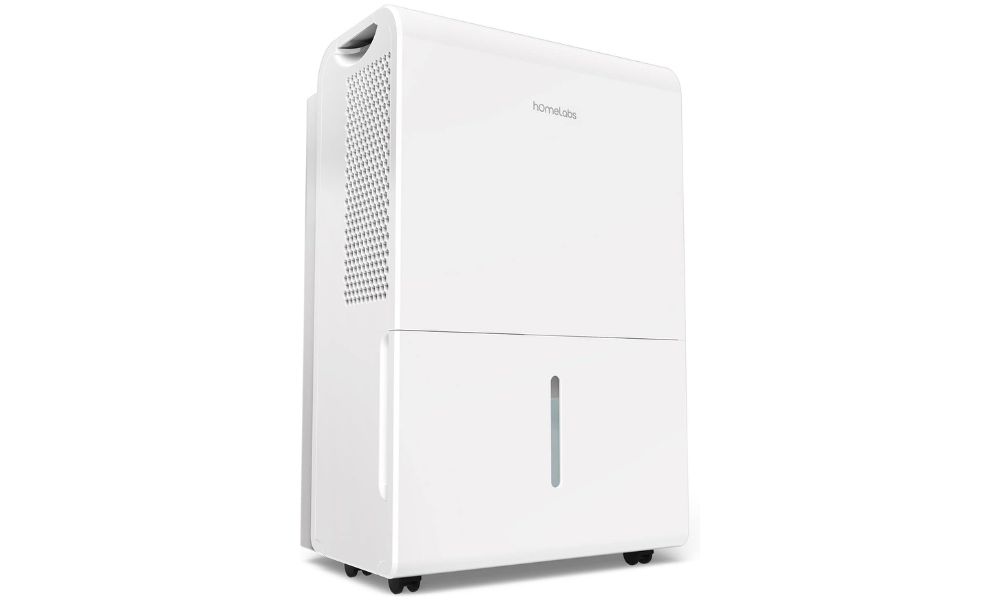
FAQ
What Should The Humidity Be In A Garage?
Aim for a sweet spot between 30-50% humidity. This range discourages mold growth, protects belongings from moisture damage, and keeps the air breathable. Exceeding 55% humidity raises red flags, signaling potential moisture problems.
What Humidity Is Too High For Garage?
Anything above 55% is considered dangerous territory. This high humidity creates a breeding ground for mold, attracts unwanted pests, and can even damage stored items like cardboard boxes and wooden furniture.
Is It Worth Putting A Dehumidifier In A Garage?
Absolutely! If you live in a humid climate or store moisture-sensitive items, a dehumidifier can be your garage’s best friend. Think about what you keep in your garage:
- Classic car or motorcycle: Maintaining a consistent, low-humidity environment is crucial for protecting your prized vehicle from rust and mold growth.
- Musical instruments: These can be damaged by excess moisture, affecting their sound and playability.
- Tools and equipment: From power tools to gardening equipment, keeping them rust-free ensures they’re always ready for action.
- Seasonal decorations and clothing: Mold and mildew can wreak havoc on stored items like holiday ornaments or out-of-season clothing.
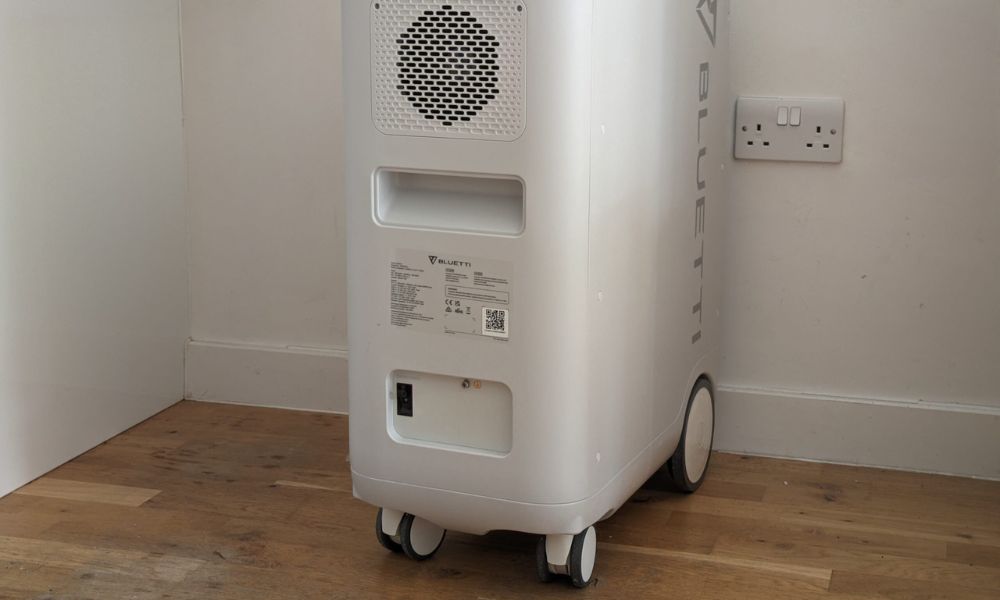
How Long Does A Dehumidifier Take To Dry A Room?
It depends on three main factors:
- Garage size: Bigger garages take longer.
- Humidity level: Super humid garages need more “dehumidifying therapy.”
- Water damage extent: Major leaks mean more drying time.
Generally, expect 24-72 hours for it to work its magic, but this can vary. Remember, consistency is important! Keep it running continuously until the desired humidity level is reached.
Is It OK To Leave A Dehumidifier On All Day?
Most modern dehumidifiers have auto-shutoff features that turn them off when the desired humidity is reached.
However, leaving it on continuously won’t harm it, as long as the water tank is emptied regularly. It’s just inefficient and unnecessary. Consult your specific model’s instructions for optimal usage.
Where Should A Dehumidifier Be Placed In A Garage?
Choose a central location with good air circulation, away from walls and heat sources. Place it on a level surface and ensure the drain hose is properly positioned.
Remember, proper ventilation is also key to controlling garage humidity. Open garage doors regularly or invest in exhaust fans to promote airflow and prevent moisture buildup.
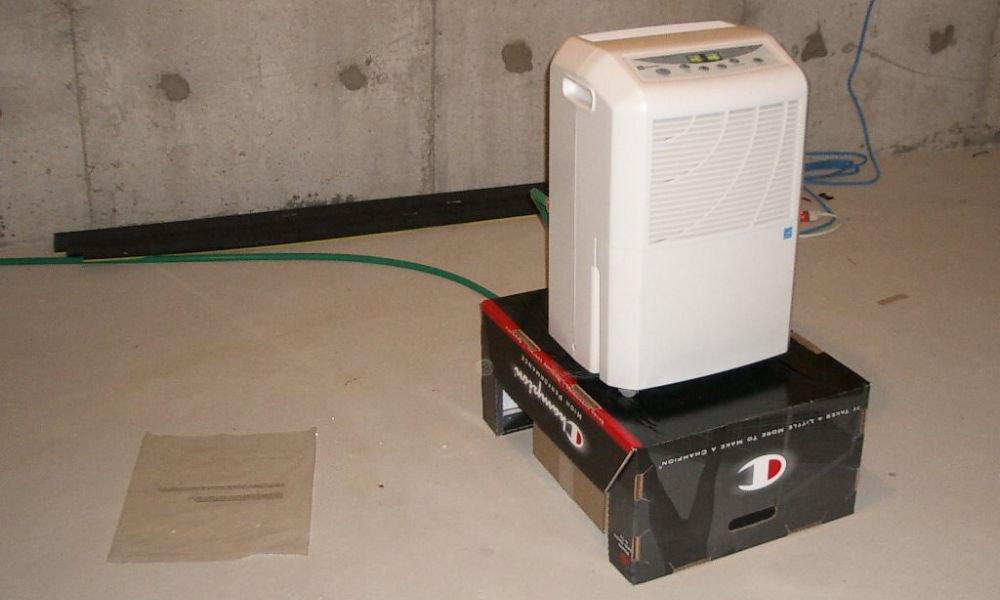
Should A Dehumidifier Be On the Floor?
While not strictly necessary, placing it slightly off the ground has several advantages:
- Better air circulation: This allows the dehumidifier to draw in more air from all sides, improving its efficiency.
- Reduced dust and dirt: Keeping it off the floor minimizes its exposure to dust and dirt, prolonging its lifespan and reducing maintenance needs.
However, the floor restricts airflow and exposes it to dust and dirt. Opt for the 6-12 inch elevation mentioned above for optimal performance.
Do Dehumidifiers Use A Lot Of Electricity?
While energy consumption varies based on models and settings, modern dehumidifiers are generally energy-friendly.
Look for models with Energy Star certification to maximize savings. Remember, preventing moisture problems in the first place can be more energy-efficient than constantly battling them with a dehumidifier.
Will A Dehumidifier Stop Mould In Garage?
Think of a dehumidifier as a preventative shield against mold, not a magic eraser.
If you already have mold, tackle the source of the moisture first (leaky pipes, poor ventilation) and clean the mold itself before relying on a dehumidifier to maintain a healthy environment.
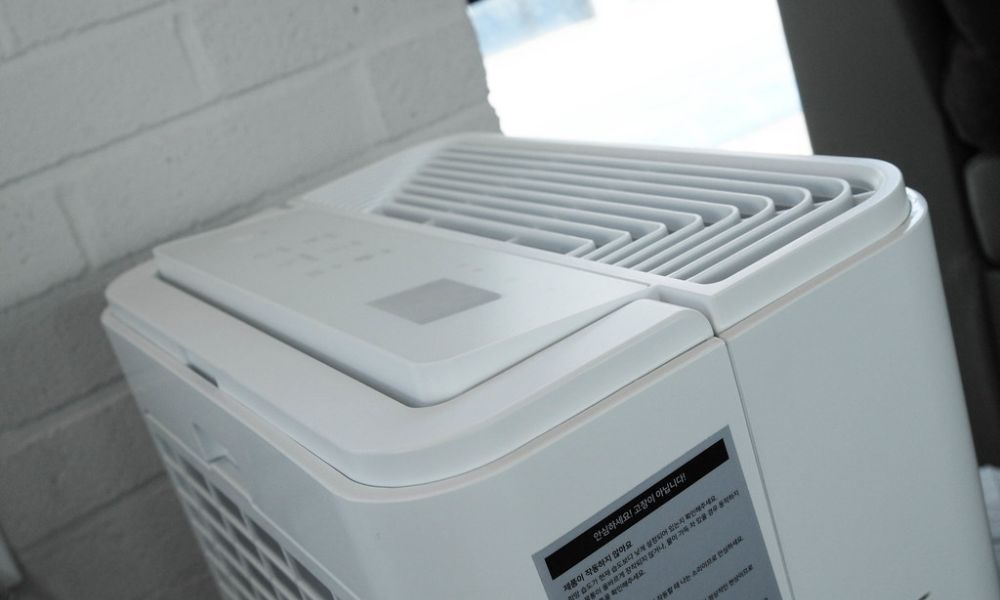
Is It Ok To Use A Dehumidifier In Winter?
Yes, with some considerations. Most of them work effectively down to temperatures around 40F (4C). However, performance can decrease below this point.
Where Should You Not Use A Dehumidifier?
These work best in controlled environments. Avoid using them in:
- Uninsulated spaces: In uninsulated garages, the dehumidifier will constantly battle against the outside humidity, making it less effective and energy-hungry.
- Rooms with open flames or flammable materials: Dehumidifiers can create sparks, so keep them away from anything flammable for safety reasons.

